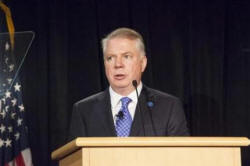|
 Seattle
Mayor Finds Impasse Over $15 Hourly Wage Proposal Seattle
Mayor Finds Impasse Over $15 Hourly Wage Proposal
 Send a link to a friend
Send a link to a friend
[April 25, 2014]
By Eric M. Johnson
SEATTLE (Reuters) — A coalition of
business, labor, and nonprofit interests assembled by the mayor of
Seattle has failed to agree on a proposal that, if adopted by lawmakers,
would raise the city's minimum wage to $15 per hour, more than double
the U.S. national rate.
|
|
 The issue has been hotly debated in the city in Washington state
where the hourly minimum wage of $9.32 is already the highest in the
United States. Opponents say increases would cost jobs while
proponents say they are needed to lift an ailing middle class. The issue has been hotly debated in the city in Washington state
where the hourly minimum wage of $9.32 is already the highest in the
United States. Opponents say increases would cost jobs while
proponents say they are needed to lift an ailing middle class.
Mayor Ed Murray, a Democrat who won office in November promising to
tackle the income gap through consensus, had been expected to
announce a proposal, but instead gave his advisory panel more time.
If the committee fails to hammer out a deal, Murray said he would
send his own proposal to the City Council.
"We're stuck at the moment," Murray told a news conference on
Thursday. "I'd rather be late and get it right than rush it and get
it wrong."

Despite a thriving technology sector and joblessness below the
national average, advocates say low-wage workers are languishing — or fleeing — under stagnant incomes and high rents in a city seen as
a liberal bastion.
"The middle class in this country is shrinking, it is falling
apart," Murray said.
Proposals to raise the minimum wage have been considered in nearly
three dozen states in 2014, according to the National Conference of
State Legislatures. Increases have been approved in Connecticut,
Delaware, Maryland, Minnesota, West Virginia and Washington, D.C.
[to top of second column] |

Seattle suburb SeaTac in November approved an initiative enacting a
$15 minimum wage for some workers, though it has been challenged in
court.
Murray said the 24-member group broadly agreed on such principles as
phasing-in a $15 hourly wage depending on company size that would be
boosted over time by a cost-of-living mechanism, but he declined to
say why the group failed to agree on a proposal to put to lawmakers
before this week's deadline.
Murray said he sought a "super majority" to try to avoid an
acrimonious and expensive ballot-box fight over competing wage
initiatives pursued instead by labor, commerce or other groups that
would amount to a "a mini version of class warfare."
(Editing by Alison Williams)
[© 2014 Thomson Reuters. All rights
reserved.] Copyright 2014 Reuters. All rights reserved. This material may not be published,
broadcast, rewritten or redistributed.
 |